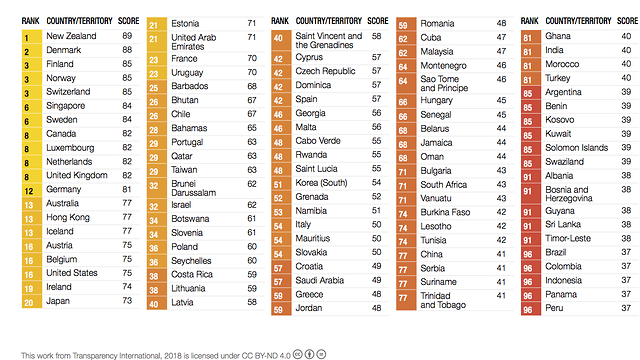
File photo
Photo: Shin Bet
In 2017, Israel dropped from a the 28th to the 32nd place on the world corruption index. Among 35 members of the OECD, Israel is ranked 23rd.
The world corruption index is published by NGO Transparency International (TI) through its local branches all over the world. in Israel, its data comes from the local subsidiary of the organization.
According to the list, the least corrupt country is New Zealand, which replaced Denmark at the number one spot. Denmark is second, followed by Finland, Norway, Switzerland, Singapore, Sweden, Canada, Luxemburg, Holland and Britain.
Israel also trails: Germany, Australia, Hong Kong, Iceland, Belgium, USA, Ireland, Japan, Estonia, the UAE, France, Uruguay, Barbados, Bhutan, Chile, the Bahamas, Portugal, Qatar, Taiwan and the Sultanate of Brunei.
Trailing Israel are: Slovenia, Poland, Lithuania, Latvia, Cyprus, the Czech republic, Spain, Georgia, Malta, South Korea, Italy, Slovakia, Croatia and Saudi Arabia, among others.
The world’s most corrupt countries, according to the index, are Iraq, Venezuela, North Korea, Equatorial Guinea, Guinea Bissau, Libya, Sudan, Yemen, Afghanistan, Syria, South Sudan and Somalia completes the list as the most corrupt country on earth.
The index ranks 180 countries in the world giving them a score and a rank which express the perception of corruption in the public sector based on 13 sources of information and 12 independent research institutions that choose their own methodology.
These sources are experts in the areas of governance, civil society, economics and business administration, and the examination of the findings is carried out through academic researchers, world experts and businessmen in these fields, in research institutes and in the countries assessed.
Each country is measured by identical questions by at least 6-7 research institutes. Israel was examined by seven research institutes. The questions are directed to experts in various fields of research at academia and among senior business people, including those in the country being measured.
The information sources of the research institutes are varied: interviews, surveys and assessments of business people and experts through research institutes within and outside of the country.

















